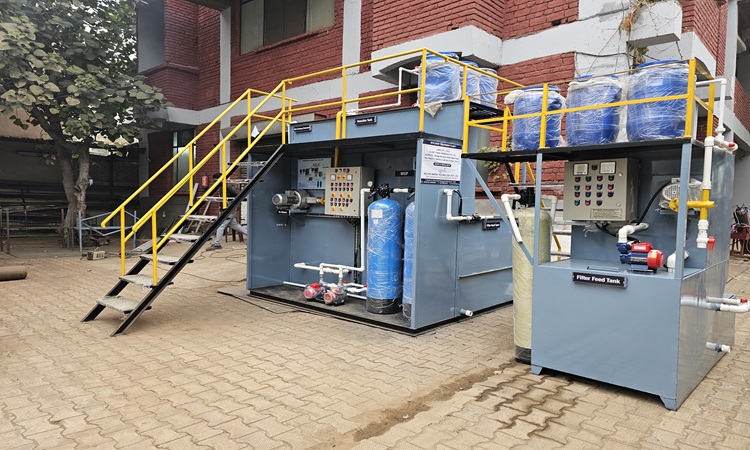What Are the Latest Technologies Used in Sewage Treatment Plants?

In today’s rapidly urbanizing world, effective wastewater management is essential for environmental sustainability, public health, and water conservation. Sewage Treatment Plants (STPs) have evolved from basic physical treatment systems to advanced biological and chemical processing units. With rising population density and increasing pollution, the demand for more efficient and compact sewage treatment solutions has given rise to modern technologies in the field.
1. Membrane Bioreactor (MBR) Technology
MBR is one of the most advanced technologies in sewage treatment. It combines traditional biological treatment with membrane filtration. The membrane acts as a barrier to solids and bacteria, allowing only clean water to pass through.
Key Benefits:
- Produces high-quality treated water suitable for reuse
- Reduces the footprint of the plant
- Lower sludge production
Applications: Hotels, hospitals, residential complexes, and industries where space is limited and water reuse is important.
2. Sequential Batch Reactor (SBR) Technology
SBR is a fill-and-draw type activated sludge process. The treatment is carried out in batches, involving aeration, settling, and decanting in the same tank.
Key Benefits:
- Cost-effective and flexible operation
- Ideal for varying wastewater loads
- Simplified plant design
Applications: Small to medium-sized municipalities, townships, and gated communities.
3. Moving Bed Biofilm Reactor (MBBR)
MBBR technology uses specially designed plastic bio-media that supports the growth of microorganisms. These media are suspended in an aerated tank and enhance biological treatment efficiency.
Key Benefits:
- Compact design
- High treatment efficiency with low sludge generation
- Requires less maintenance
Applications: Residential societies, industries, commercial complexes, and retrofitting of old STPs.
4. Integrated Fixed film Activated Sludge (IFAS)
IFAS is a hybrid system combining activated sludge and attached growth processes. It includes fixed media that allows microorganisms to grow and improve the biological degradation of waste.
Key Benefits:
- Increased biomass retention
- High load-bearing capacity
- Ideal for existing plants with limited expansion options
5. Electrocoagulation Technology
Electrocoagulation is a chemical-free method where an electric current is passed through wastewater. It removes contaminants through precipitation and coagulation.
Key Benefits:
- Low chemical usage
- Effective for removing heavy metals, oil, and suspended solids
- Compact and energy-efficient
Applications: Industries generating wastewater with oil and grease or heavy metals, such as textile, food processing, and chemical plants.
6. Tertiary Treatment with UV and Ozone
Tertiary treatment involves advanced processes like UV disinfection and ozonation for final polishing of the treated water.
Key Benefits:
- Kills pathogens and microorganisms
- Makes water safe for reuse
- No harmful chemical residues
Applications: Recycled water systems for landscaping, flushing, and industrial applications
7. Automation and SCADA in STPs
Modern STPs are now equipped with automation systems and SCADA (Supervisory Control and Data Acquisition). These systems offer real-time monitoring, control, and data logging.
Key Benefits:
- Improved process control
- Reduced manpower
- Preventive maintenance through alerts
Applications: Municipal and industrial plants looking to increase efficiency and reduce operational risks.
8. Decentralized and Containerized STPs
Compact, containerized STPs are gaining popularity for remote or space-constrained locations. These plug-and-play systems are prefabricated and easy to install.
Key Benefits:
- Quick deployment
- Minimal civil work
- Scalable and relocatable
Applications: Construction sites, resorts, remote institutions, military camps.
Kelvin Water Technologies Pvt. Ltd. – Innovating Sewage Treatment in India
Kelvin Water Technologies Pvt. Ltd. is a leading Indian manufacturer and supplier of innovative sewage treatment solutions. With years of experience and a strong focus on R&D, the company offers a comprehensive range of STP systems for residential, commercial, and industrial applications.
Why Choose Kelvin Water Technologies?
✅ Advanced Technology Integration
Kelvin Water Technologies incorporates the latest technologies like MBR, SBR, MBBR, and IFAS into their STP designs. Their systems are engineered for high performance, compactness, and long-term reliability.
✅ Customized Solutions
Every client has different wastewater characteristics. Kelvin provides tailor-made solutions based on the inflow, land availability, discharge norms, and intended reuse applications.
✅ Eco-Friendly and Energy Efficient
Kelvin’s sewage treatment plants are designed to be energy-efficient and environmentally responsible. Their systems focus on low power consumption and minimal chemical usage, supporting green building norms.
✅ Automation and Remote Monitoring
Kelvin integrates smart controls, PLC panels, and IoT-based monitoring in their larger installations to help customers manage operations effectively and predictively.
✅ Turnkey Project Execution
From design to commissioning and after-sales support, Kelvin Water Technologies offers end-to-end project execution for sewage treatment systems, including AMC and O&M contracts.
✅ GeM Registered Supplier
Kelvin is an approved and verified vendor on the Government e-Marketplace (GeM), offering STPs to government institutions, PSUs, and smart city projects.
Conclusion
The sewage treatment landscape is evolving fast, thanks to technological innovations aimed at reducing environmental impact and increasing water reuse efficiency. Technologies like MBR, MBBR, SBR, and electrocoagulation are setting new benchmarks for performance and sustainability. Automation and compact modular systems are also transforming the way plants are operated and managed.
Kelvin Water Technologies Pvt. Ltd. stands at the forefront of this transformation, delivering high-quality, future-ready STP solutions to a wide range of clients across India. Their commitment to innovation, sustainability, and customer satisfaction makes them a trusted name in modern wastewater management.